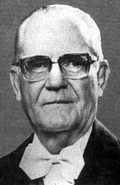The son of a Bavarian immigrant, Ernesto Beckmann Geisel was a brilliant student of the military schools in Porto Alegre and Rio de Janeiro. Commissioned a second lieutenant in 1928 and promoted to first lieutenant in 1930, Geisel supported the Revolution of 1930 led by Getúlio Dorneles Vargas. Geisel served in a variety of military and civil administrative posts including secretaryship of the local governments in Rio Grande do Norte (1931) and Paraíba (1934, 1935). In 1945 Geisel played an important part in the military coup against Vargas. In addition to his military positions, he served as secretary general of the National Security Council (1946-1947), military attaché in Uruguay (1947-1950), deputy chief of the military staff of the Presidency (1955) and military representative to the National Petroleum Council (1957-1958, 1959-1961). Promoted to brigadier general in 1960, Geisel participated in the military coup of 1964 and became chief of President Humberto Castelo Branco's military staff (1964-1967). After serving for two years as a minister of the Superior Military Tribunal (1967-1969), Geisel took the presidency of Petrobrás (1969-1973), the national oil corporation. Geisel was a choice of the outgoing president Emílio Garrastazu Médici and the military oligarchy for installation as the next President of the Republic. The election of 15 Jan 1974 was also contested by the opposition, but to no avail as the electoral college, controlled by the pro-governmental National Renewal Alliance Party (Aliança Renovadora Nacional), voted for Geisel. Inaugurated as president, Geisel initiated gradual liberalization (abertura) of the military regime, but he kept a strong hold on state power invigorated by the Institutional Acts. The administration permitted open legislative elections in 1974, where the legal opposition gained more seats than it had before. Geisel pursued a middle path between the supporters of democratic freedoms and military hardliners. Using his extraordinary powers, he removed opposition legislators and placed the Congress in recess whenever he failed to obtain necessary legislation by constitutional means. In 1977 he reaffirmed the Falcão law providing for indirect election of state governors and approving constitutional amendments by a simple majority of votes. During the presidency of Geisel, Brazilian economy maintained a rapid growth rate. A new economic policy, "pragmatic nationalism," called for development of domestic industry. At the end of his term Geisel agreed to the demands of conservatives not to allow direct elections of president, but the regime formally abolished censorship and repealed (31 Dec 1978) the Institutional Act No. 5, a source of extraordinary power for the military presidents since 1968. After the completion of his term as president, Geisel headed Norquisa, a private chemical company (1980-1991). [2] |

